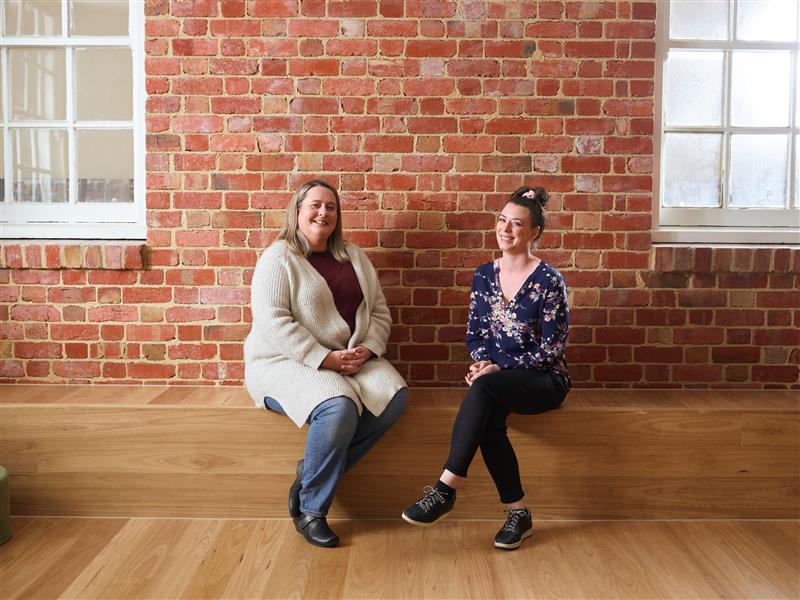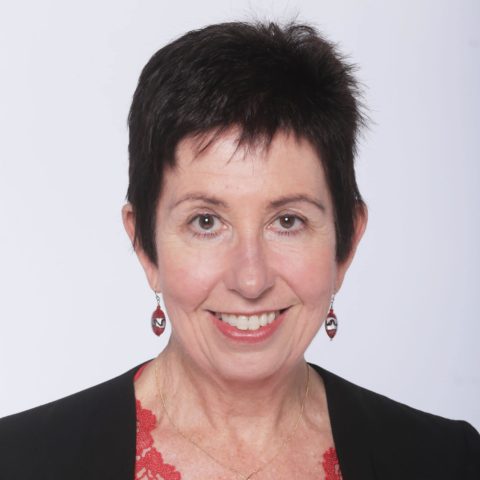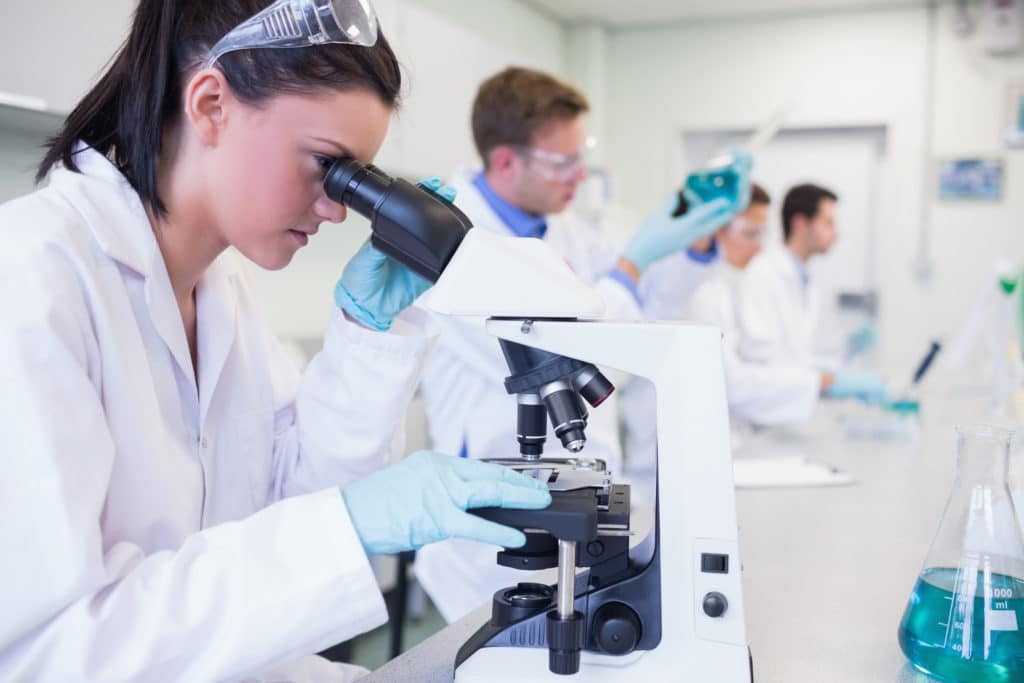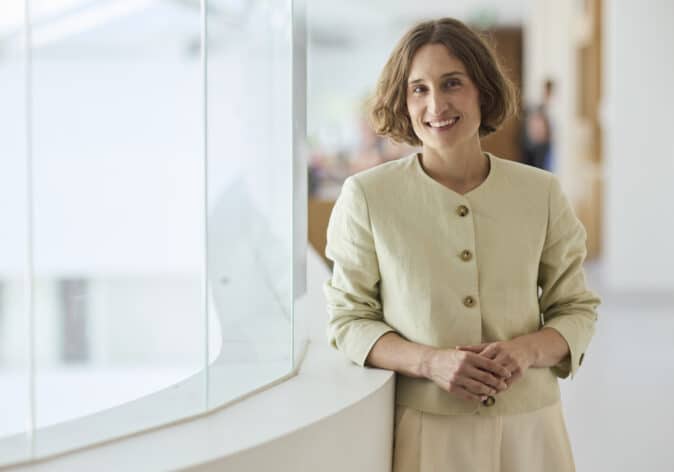What Is Genetic Testing?
Genetic testing involves looking for a fault or mutation in genes that cause a high risk of developing breast and ovarian cancer within a family. These mutations are often found in the BRCA1, BRCA2, and PALB2 genes. Genetic testing for breast cancer testing is done on a blood sample, usually starting with an affected family member. If a gene mutation is detected, other family members can be tested. This is known as predictive genetic testing.
Genetic testing is typically offered through a cancer clinic if appropriate, and a referral to a familial cancer clinic is arranged to consider genetic testing. Before testing occurs, you are counselled about the process to understand the potential implications.
Associate Professor Judy Kirk is a cancer geneticist at the Familial Cancer Service at Westmead Hospital.
She says genetic testing is looking for a mistake in the gene that causes a high risk of breast and ovarian cancer within a family.
“It’s testing that’s done on blood, in a family with a pretty strong family history of breast cancer where we would start by testing an affected family member.”
“Usually, we test a woman who’s had either breast or ovarian cancer, and we search a number of different genes to try and find a fault or mutation, that’s passed down through the family that causes that high risk,” she said.
“When we do that, there are a number of different genes that we can test and the ones that relate to breast cancer are two genes we’ve known about now for over 20 years. One of them is called BRCA1, the breast cancer one gene, and the other called BRCA2, the breast cancer two gene, and more recently it’s been found that mutations in another gene, known as PALB2 also cause a higher risk of breast cancer.”
Listen to the podcast
Cancer Geneticist Associate Professor Judy Kirk explains who should get genetic testing, what exactly a ‘strong family history’ means and how you can get tested. Find out more in this podcast episode.
Who Should Consider Genetic Testing?
Genetic testing for breast cancer is a crucial tool in identifying individuals at risk. You may consider it if you meet any of the criteria below:
- Personal History of Cancer: According to Harvard Medical School, individuals with a personal history of breast or ovarian cancer, especially if diagnosed at age 50 or younger. Males with breast cancer at any age should consider testing.
- Family History of Cancer: Individuals with two or more close family members (parents, siblings, and/or children) with a history of breast or ovarian cancer should consider testing.
- Known BRCA1 or BRCA2 Gene Mutations: If there is a family history of BRCA1 or BRCA2 gene mutations, genetic testing is recommended.
- Ashkenazi Jewish Heritage: Individuals of Ashkenazi Jewish descent are at a higher risk.
In the first instance, a genetic test is done on a family member who has been affected by breast cancer. If the immediately affected family member has died or cannot be tested, other family members can still choose to be tested.
The information gained from the test can only be used for that individual tested and cannot tell us about the entire family. If no genetic fault is found in the tested individual, it is reassuring but does not rule out the possibility of a genetic fault in the family. Each family member would need to undergo genetic testing to understand their own risk.
Genetic testing for breast cancer is typically offered only through a cancer clinic where benefits and possible consequences of genetic testing will be discussed with the individual.
Genetic testing is a complex process and should always be undertaken with appropriate counselling and an understanding of the potential implications.
“I originally got tested for the BRCA mutation after my Auntie was diagnosed with breast cancer. She was 47. And then when my cousin turned 30 and she was diagnosed with breast cancer in 2013. So, all of my family started getting tested at that point which included myself and in 2015 I found out I carried the gene mutation,” Skye said. Learn more about Skye’s story.

What is a ‘Strong Family History’?
Associate Professor Kirk said a ‘strong family history’ is when there are two or more affected family members on one side of the family. Sometimes, individuals may not know this information, or their family may be predominantly male. In these cases, other factors are considered:
- Early age at breast cancer diagnosis.
- Presence of triple-negative breast cancer.
- High-grade, invasive epithelial ovarian cancer.
“Inherited gene mutations are not necessarily more common on the mother’s side of the family. Both sides of the family are equally more important in assessing risk”, she said.
“There are other things that we might look for, and they would include: early age at breast cancer diagnosis, the presence of triple negative breast cancer in a young woman, less than 50 years of age at diagnosis, ovarian cancer specifically high grade, invasive epithelial ovarian cancer. Most women with that type of cancer is now offered a genetic test.”
What Happens if you Test Positive for the BRCA Gene?
If your test results identify a mutation in the BRCA gene, a personalised risk management plan is developed. Individuals with the BRCA1 gene mutation would typically commence their breast screening from age 30 in a specialised risk management clinic. This offers the expertise as well as the access to breast MRI for screening in addition to mammography or ultrasound. Additionally, these individuals are also given the option of risk-reducing surgery to remove all breast tissue, which is chosen by approximately 30% of high-risk women.
The BRCA 1 or 2 gene mutations also increase the risk of developing ovarian cancer. As there is no screening test for ovarian cancer, the best option is to consider surgery to remove the ovaries and fallopian tubes once a woman has finished their family by about the age 30.
“They usually start it in a risk management clinic where there’s special expertise and the availability of breast MRI for screening rather than simply mammography ultrasound and of course, those women are also given the opportunity risk reducing surgery for the breast tissue, which is taken up by maybe about 30% of high-risk women,” Associate Professor Kirk said.
“Many choose to have screening, but I think the more important thing is that these women, if they have a BRCA1 or BRCA2 mutation, are also at very high risk of ovarian cancer.”
“So it’s very important to identify these women because we can save lives from cancer if we look after them appropriately.”
Genetic Counselling
Genetic counselling typically involves:
- Risk Assessment: Genetic counselling begins with a risk assessment based on your personal and family history of breast cancer. This can help determine your likelihood of having an inherited BRCA gene mutation.
- Education: Genetic counsellors provide information about inherited gene changes that can increase breast cancer risk, such as BRCA1 and BRCA2 gene mutations.
- Testing Considerations: Genetic counsellors discuss the pros and cons of genetic testing, helping you understand what genetic testing can and cannot tell you before these tests are done. It is important to understand the implications for insurance and impacts on other family members.
- Support: Genetic counsellors provide resources and support to help you and your family make informed decisions about genetic testing.
What is the Life Expectancy of Someone with the BRCA Gene?
Individuals with BRCA1 or BRCA2 mutations have an increased risk of developing certain cancers, particularly breast and ovarian cancers. However, having a BRCA gene mutation does not directly affect life expectancy.
The specific impact on life expectancy depends on various factors, including the individual’s overall health, access to medical care, early detection, and the effectiveness of preventative measures taken.
Where Can I Get Genetic Testing in Australia?
If you have a strong family history and would like to be tested, Associate Professor Kirk said to contact your local familiar cancer clinic.
“Most of this genetic testing is done through specialist clinics, either private or public and the genetic testing is covered by the system either Medicare or by the state health departments where it’s quite likely that we’ll find something, perhaps an over 10% chance that we’re going to find something.”
“If the chance is less than that, it tends not to be covered by the system and in that case the patient can pay for that testing,” she said.
“Again, it’s usually done through a specialist familiar cancer service, so that they understand the limitations of the testing in that circumstance and the implications of insurance and for other family members etc.”
“So, they’re fully informed before the testing about what could be expected, what genes are going to be tested and what could be the impact of finding something or finding nothing in some situations.”
QUICK ACCESS

Associate Professor Judy Kirk
Support Us
Help us to change lives through breast cancer clinical trials research
Podcast Transcript
-
Breast Cancer Genetic Testing: Should You Get It?
Genetic testing helps to estimate your risk of developing cancer in your lifetime, by searching for specific changes in your genes, chromosomes or proteins. But it’s not advisable for everyone to undertake genetic testing. To help understand who should get genetic testing, what exactly a strong family history means, and how you can get tested, we sat down with cancer geneticist Associate Professor Judy Kirk from the Familial Cancer Service at Westmead Hospital.
“Genetic testing comes in various forms, but what we’re talking about today is looking for a mistake in the gene that causes a high risk of breast cancer within a family. That’s testing that’s done with blood, in a family with a pretty strong family history of breast cancer, where we would start by testing an affected family member first, usually a woman who had breast cancer and we search a number of different genes to try and find a fault or mutation that’s passed down in the family and causes that high risk. And when we do that, there are a number of different genes that we can test, and the ones that I talked about mainly today that are in relation to breast cancer are two genes that we’ve known about for over twenty years. One of them is called BRCA1, the breast cancer one gene, the other is called BRCA2, the breast cancer two gene and more recently, it’s been found that mutations in another gene, known as PALB2, also cause a higher risk of breast cancer. So those are the genes that are routinely tested first when you’re trying to ascertain the cause of breast and ovarian cancer in a family.
I also spoke about some other genes which are related to breast cancer; there are a few different ones, TB53 and P10, that cause quite unique features in a family. So generally we don’t necessarily test those other genes unless there’s a specific indication for that, where the family history leads us away from the usual culprits. So when you’re testing families with breast cancer, only a small number have a gene fault that causes it, and usually it’s in a gene such as BRCA1, BRCA2 or PALB2. So these are normal genes that we’ve all got, but some people have a mistake in the gene that causes a problem.
Usually, people who undergo this testing have a strong family history. What’s considered a strong family history?
Generally, it’s three or more affected family members, but there are other features, all on one side of the family. If people are looking for information about this, EVIQ is a good resource that talks about the type of people who are not so much eligible for genetic testing, but for the sorts of families that genetic testing might help. However, often we look for a family history and sometimes people don’t know their family, or their family is all male, so they won’t have as strong a family history.
There are other things that we might look for, and they would include: early age at breast cancer diagnosis, the presence of triple negative breast cancer in a young woman (less than 50 years old), things like ovarian cancer, specifically high-grade invasive epithelial ovarian cancer. Most women with that type of cancer are offered a genetic test. Increasingly, those tests have been covered up until now (where its likely to be useful) by the state health departments at public genetics clinics but from November 2017, there have been some medicare item numbers specifically for testing those genes: BRCA1, BRCA2 and a couple of other genes.
Usually, in an affected family member, to try and find the cause first and then once you’ve found the gene mutation that’s caused the problem, those medicare item numbers cover what’s called the predictive testing of other family members to see if they’ve got that faulty gene or not. And there’s a consequence of that, for people with the faulty gene, let’s say BRCA1, will start their screening from 30, they usually start it in a risk management clinic where there’s special expertise and the availability of breast MRI for screening rather than simply a mammogram and ultrasound.
Of course, those women are also given the opportunity of having risk-reducing surgery for the breast tissue, which is taken up by maybe 30% of high-risk women, many choose to have screening. I think the most important thing is that these women, if they have a BRCA1 or BRCA2 mutation, are also at very high risk of ovarian cancer. There is no screening test for that. And so once they finish their family by about age 40, the best approach at the moment is to remove the ovaries and fallopian tubes and that is the single most important thing that saves lives in these families. So it’s very important to identify these women because we can save lives from cancer if we look after them appropriately.
People go and they get the BRCA1 or BRCA2 test, it sometimes comes up negative, but there is that strong family history. You’ve mentioned there are other indicators and that you’ll go and test for – what are those indicators and what would push you to further test these patients?
Remember that genetic testing usually starts with an affected family member, rather than the unaffected family member. If that affected family member with breast cancer for example, has black spots around their mouth and a history of terrible polyps which have been problematic from their childhood, we would know that that person probably has a mutation in a completely different gene, STK11 and that causes that problem of Peutz-Jeghers Syndrome where there is a high risk of breast cancer but they’ve usually presented earlier because of polyps and even the spots around their mouth. Another example would be that, for a family where there is a problem in the gene for P53, there’s often a different problem in the family history that might involve early breast cancer, even in the twenties, but often really a devastating history of childhood cancers, multiple cancers in the same person, unusual and young cancers, so it’s very important to take a full family history for all different sorts of cancers and then try to put together the picture so you can work out which genes are most appropriate to test.
The process starts with testing someone who has breast cancer – does it fall maybe through the father’s side, the mother’s side, or is it more common on one side?
Well, the answer to that is definitely not. Very often, it’s distressing to hear people who say “Oh yes, they didn’t worry about my family history because it’s on my dad’s side.” But actually it’s equally important and so while we don’t add the two sides of the family together. We always take the mum’s side, we always take the dad’s side, and we act on the side that looks more worrisome.
You test the person affected by breast cancer first. What if there isn’t somebody, what if it’s a daughter who has lost their mother? Are they able to go and get screened?
They are. That testing is not covered by the system. That would be an out-of-pocket expense, but much less so than it used to be for that sort of testing. The thing is, if you find nothing in that woman, that’s quite reassuring. But you still don’t know if there’s a genetic fault in the family. So that young woman would be tested, and then her sisters would be no better off. Each sister would have to have the genetic testing in order to reassure themselves about themselves and their family. So if you can, it’s wisest to do it in the way I explained. But of course, sometimes we don’t have that opportunity, and so a person can have a genetic test that gives more information for themselves rather than for the broader family.
How do people get these tests in that situation? Do they need a referral? Are you getting a lot of people just calling up, mentioning, “I would like this test”?
No, surprisingly, we don’t. Unfortunately, I mean, GPs don’t know a lot about these things and so there are guidelines about who should be referred and where genetic testing is most likely to be useful in the first instance. Most of this genetic testing is done through specialist clinics, either private or public, and the genetic testing is covered by the system, either Medicare or by the state health departments where it’s quite likely where we will find something (perhaps an over 10% chance that we’re going to find something). If the chance is less than that it tends not to be covered by the system and in that case the patient can pay for that testing, again usually done through a specialist family cancer service so that they understand the limitations of the testing in that circumstance and the implications for insurance and other family members etc. so they’re fully informed before the testing about what could be expected, what genes are going to be tested and what would be the impact of finding something, or finding nothing in some situations.
That was Associate Professor Judy Kirk from Westmead Hospital’s Familial Cancer Service. If you’d like to learn more about Breast Cancer Trials or you’d like to support our life-saving research, follow us on social media, or visit our website at breastcancertrials.org.au



